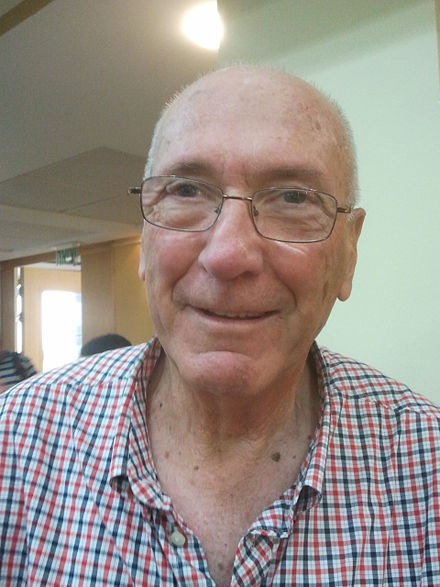Arnon Soffer, an Israeli geographer and professor emeritus at the University of Haifa, is no stranger to controversy. Known as one of Israel’s foremost demographers, Soffer has spent decades raising alarms about the country’s shifting population dynamics and the geographic challenges he believes threaten its future. Born on December 24, 1935, in Tel Aviv to Belarusian immigrants, Soffer grew up in the fledgling city of Rishon LeZion, where he first showed a flair for competition as a player on Israel’s national handball team. But it was his work as a geographer that ultimately made him one of the nation’s most polarizing figures, thanks to his outspoken views on Israel’s “demographic threat.”
When 2.5 million people live in a closed-off Gaza, it’s going to be a human catastrophe.
Those people will become even bigger animals than they are today, with the aid of an insane fundamentalist Islam. The pressure at the border will be awful.
It’s going to be a terrible war. So, if we want to remain alive, we will have to kill and kill and kill. All day, every day.
If we don’t kill, we will cease to exist.
The only thing that concerns me is how to ensure that the boys and men who are going to have to do the killing will be able to return home to their families and be normal human beings.
The Jerusalem Post: 20 May, 2004 – Interview with Arnon Soffer by Ruthie Blum
For over thirty years, Soffer has argued that the growing Palestinian population represents a risk to Israel’s Jewish and democratic identity, and his contributions to the 2005 Gaza Disengagement Plan positioned him as a key figure in one of the country’s most contentious political moves. In a 2004 interview with The Jerusalem Post, Soffer bluntly predicted a stark future if Israel failed to secure its borders unilaterally. “Israel is like the Titanic,” he stated, alluding to the country’s geopolitical challenges. “I am trying to change its course—prevent it from crashing into the iceberg—and allow it to continue safely on its journey.”
The Man Behind the Maps
Soffer’s journey from an academic geographer to a public geostrategist began in the early 1970s, when he observed growing Arab population centers in Israel’s northern Galilee region. This shift, he believed, could influence the security and identity of the Jewish state. As a professor and founder of the University of Haifa’s geography department, he drew maps highlighting what he viewed as crucial geographic and demographic trends, presenting them to government and military officials.
His warnings resonated deeply within political circles. Ariel Sharon, Israel’s former prime minister, reportedly sought Soffer’s advice when developing Israel’s Disengagement Plan. The plan proposed a unilateral Israeli withdrawal from Gaza to reduce tensions, minimize security risks, and, as Soffer contended, stave off a demographic shift that would leave Jews a minority within their own state.
The ‘Demographic Prophet of Doom’
In his 2004 Jerusalem Post interview, titled “It’s the Demography, Stupid,” Soffer laid out a vision that was equal parts pragmatic and grim. “When 2.5 million people live in a closed-off Gaza, it’s going to be a human catastrophe,” he predicted. Describing the conflict that would follow disengagement, he warned, “So, if we want to remain alive, we will have to kill and kill and kill. All day, every day.” The statement stirred heated debate, with critics on the left accusing Soffer of justifying violence and ethnic tension. Others saw his words as a harrowing but realistic assessment of what Israel might face without decisive action.
Soffer’s stance on the Gaza Disengagement Plan was as much about survival as it was about separating populations. “Unilateral separation doesn’t guarantee ‘peace,’” he stated in the interview. “It guarantees a Zionist-Jewish state with an overwhelming majority of Jews.” His message was clear: the only way Israel could secure its Jewish identity was to reduce its involvement with the densely populated Palestinian territories.
Clarifying the Controversy
Three years after that interview, in 2007, Soffer revisited his statements, seeking to clarify what he said had been widely misunderstood. “I didn’t recommend that we kill Palestinians. I said we’ll have to kill them,” he told The Jerusalem Post. He claimed that his statements had been taken out of context and that his objective was to emphasize the potential consequences of failing to address demographic pressures. “We are living in a 100-year period of terrorism,” he stated, “and we have another 100 years of terrorism ahead of us. We will forever be forced to live by the sword.”
Soffer continued to defend Israel’s disengagement from Gaza, citing it as necessary for both security and demographic reasons. While critics from both the left and the right saw flaws in his arguments, Soffer remained steadfast, emphasizing that Israel’s disengagement was not about peace but about maintaining its Jewish majority. “The purpose of disengagement,” he clarified, “was not to put an end to terrorism or Kassam fire. Its purpose was to stop being responsible for a million and a half Arabs who continue to multiply in conditions of poverty and madness.”
A Vision Unyielding
Despite his critics, Soffer remains committed to his warnings. His vision of Israel’s future has consistently centered around one idea: that Israel’s Jewish identity must be preserved at all costs. He believes Israel’s demographics will continue to play a critical role in the nation’s security strategy, and he sees maintaining a majority Jewish population as key to the country’s survival. “If we don’t kill, we will cease to exist,” he argued, believing that Israel’s path forward must include a blend of decisive defense and careful demographic planning.
Today, Arnon Soffer is semi-retired, though he still lectures at Israel’s National Defense College, sharing his hardline views with the next generation of Israeli leaders. His work remains a fixture in Israel’s ongoing debate over its identity, security, and future. For Soffer, the numbers are not merely statistics; they are, in his eyes, the nation’s fate.




